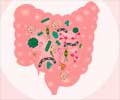There are no significant differences in intestinal inflammation, lactase deficiency, or intestinal permeability in autistic versus non-autistic children.

TOP INSIGHT
Gastrointestinal disorders like intestinal inflammation, lactase deficiency or intestinal permeability do not cause autism.
Similar Findings in Autistic versus 'Neurotypical' Children with GI Symptoms
The researchers analyzed the results of diagnostic tests in 61 children with autism being evaluated for GI symptoms, such as abdominal pain or constipation. The findings were compared with those in 50 non-autistic, or "neurotypical," children undergoing similar tests. All tests were performed as part of routine clinical care not solely for the purposes of the study.
The study focused on certain abnormalities with previously suggested links to autism. These include intestinal inflammation; deficiency of the digestive enzyme lactase, associated with lactose intolerance; and increased intestinal permeability, sometimes called "leaky gut."
Intestinal biopsy samples showed mild levels of microscopic inflammation in some of the children with autism, as well as in some of the non-autistic children. Markers of intestinal inflammation, lactase deficiency, and intestinal permeability were all similar between the children with and without autism.
These unusual symptoms have led to the suggestion that autism behaviors might be linked to underlying GI disorders--or even that GI abnormalities contribute to the development of autism. Some parents and clinicians have observed improvements in autism-related behaviors and GI symptoms with special diets and other "non-evidence based interventions."
"The results of this study suggest that common gastrointestinal problems occur in children with autism and should be evaluated," according to the authors. They add, "There is no evidence to support that gastrointestinal disorders cause autism."
The researchers emphasize that the findings of endoscopy and other diagnostic tests in autistic children with GI symptoms are similar to those in nonautistic children with similar GI symptoms. However, they note, "Identifying children with ASD who have concomitant medical conditions such as inflammatory bowel disease, malabsorption, or lactose intolerance may be challenging because their symptoms are atypical."
Source-Eurekalert
 MEDINDIA
MEDINDIA




 Email
Email





